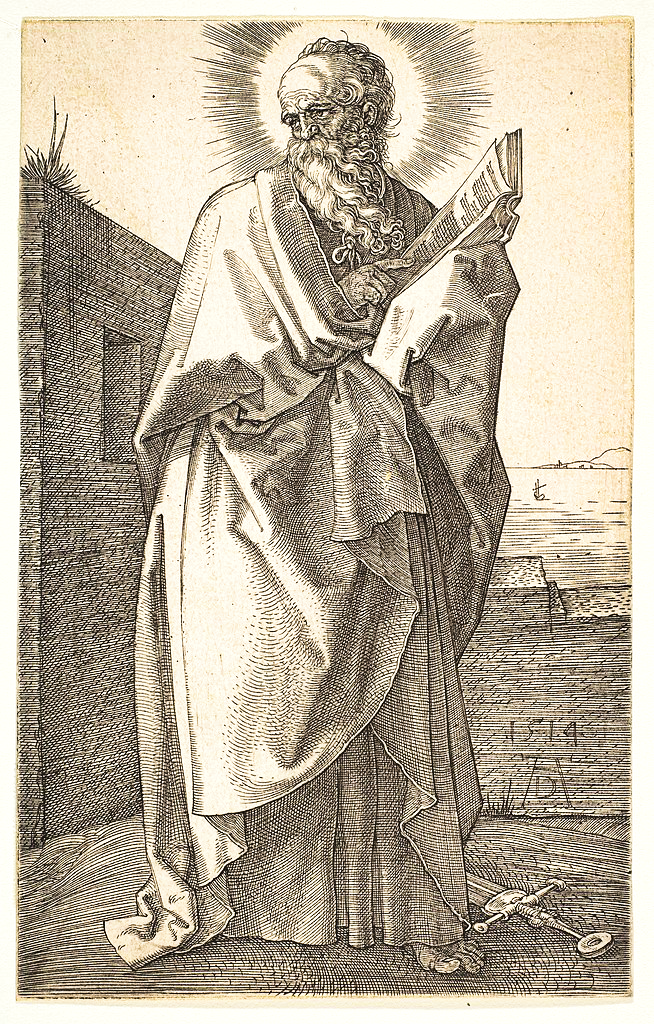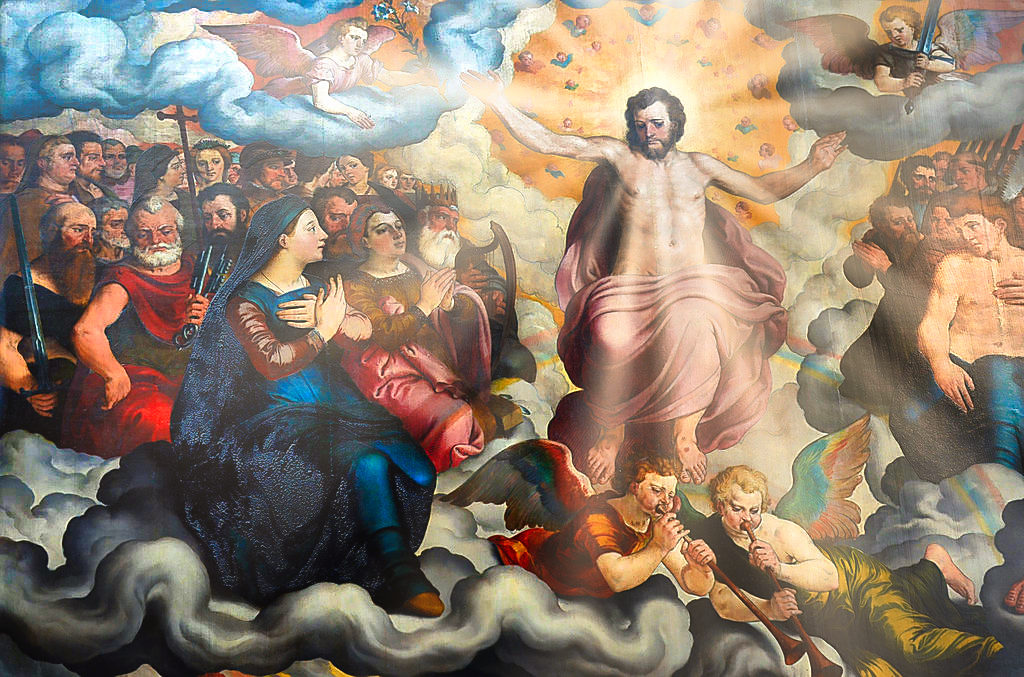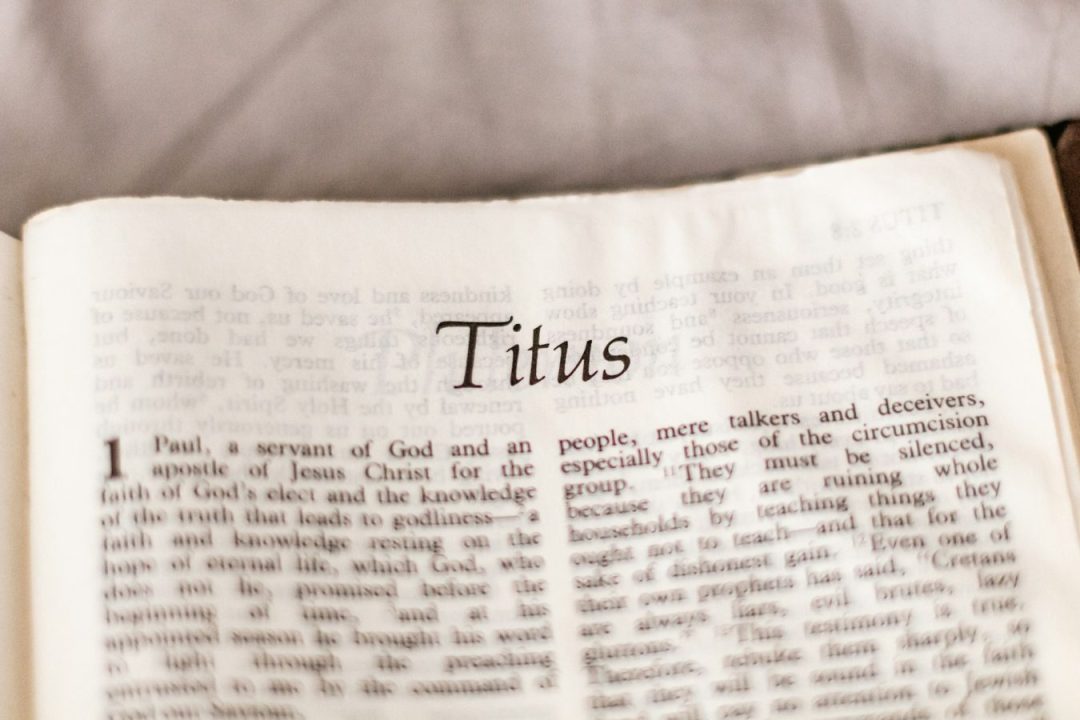1 Timothy
Chapter 1: Address

Words of Saint Paul have connected human DNA to words of God for 2000 years.
1:1 From Paul, apostle of Christ Jesus appointed by the command of God our savior and of Christ Jesus our hope, (St. Paul makes it clear that our “hope” is personified in Jesus. Since he names no other “hope”, we must focus on Jesus.)
1:2 to Timothy, true child of mine in the faith; wishing you grace, mercy, and peace from God the Father and from Christ Jesus our Lord. (We see an indication that the DNA of those who come to believe in Jesus is actually changed, making them genetically a “child” of the person who brings us to the “faith”.
The New Jerusalem Bible gives us focus, so we read this Instruction from Paul to Timothy:
“Suppress the false teachers”
1:3 As I asked you when I was leaving for Macedonia, please stay at Ephesus, to insist that certain people stop teaching strange doctrines
1:4 and taking notice of myths and endless genealogies; these things are only likely to raise irrelevant doubts instead of furthering the designs of God which are revealed in faith. (These “false teachers” were keeping the early Catholics from focusing on Jesus and on saving their souls. In every age, “false teachers” encourage donors to ignore The Only Church-Creating Word of Jesus to His First Catholic Pope: “And I say unto you thou art Peter and on this rock I build My Church and the gates of hell shall not prevail against it. I give you the keys to The Kingdom of Heaven.” Anything that keeps anyone from focusing on getting those “keys” for their immortal soul is hurtful.)
1:5 The only purpose of this instruction is that there should be love, coming out of a pure heart, a clear conscience and a sincere faith. (Simple addition: “a pure heart” + “clear conscience” + “a sincere faith” = “love”.)
1:6 There are some people who have gone off the straight course and taken a road that leads to empty speculation (The “straight course” of love for and obedience to Jesus keeps our thoughts focused on thinking, saying, and doing what will help us get His Approval and admission into Heaven.)
1:7 they claim to be doctors of the Law but they understand neither the arguments they are using nor the opinions they are upholding. (It is impossible for there to be anything but errors in any “arguments” that justify disobedience to The Church-Creating Decred of Jesus Christ to His First Catholic Pope.)
The purpose of the Law, one of the most sweeping statements of any person in The Bible:
1:8 We know, of course, that the Law is good, but only provided it is treated like any law,
1:9 in the understanding that laws are not framed for people who are good. On the contrary, they are for criminals and revolutionaries, for the irreligious and the wicked, for the sacrilegious and the irreverent; they are for people who kill their fathers or mothers and for murderers, (the “people who kill their fathers or mothers” include unloving children and those who twist Bible Teachings to justify withholding sustenance from their parents.
Mt. 15:3-7 shows what a serious issue this was: “Why do you break the command of God for the sake of your tradition? For God said, ‘Honor your father and mother’ and ‘Anyone who curses their father or mother is to be put to death.’ But you say that if anyone declares that what might have been used to help their father or mother is ‘devoted to God,’ they are not to ‘honor their father or mother’ with it. Thus you nullify the word of God for the sake of your tradition. You hypocrites!”)
1:10 for those who are immoral with women or with boys or with men, for liars and for perjurers – and for everything else that is contrary to the sound teaching
1:11 that goes with the Good News of the glory of the blessed God, The Gospel that was entrusted to me. (Laws exist to be guides to keep us in obedience to Every Teaching of Jesus. As soon as we are tempted to any sin, we must see if that temptation represents disobedience to any Teaching of Jesus’s Command to “Love God and our neighbors as ourselves”.)
Paul on his own calling
1:12 I thank Christ Jesus our Lord, Who has given me strength, and Who judged me faithful enough to call me into His service
1:13 even though I used to be a blasphemer and did all I could to injure or discredit the faith. Mercy, however, was shown me, because until I became a believer, I was acting in ignorance; (Paul explained the rewards of rejecting sin and we see that “mercy” applies to all who regret “acting in ignorance”.)
1:14 and the grace of our Lord filled me with faith and with the love that is in Christ Jesus.
1:15 Here is a saying that you can rely on and nobody should doubt: that Christ Jesus came into the world to save sinners. I myself am the greatest of them; (Since Paul worked harder than anyone to kill and punish early Catholics before The Light of God was revealed to him on The Road to Damascus, he knew the truth of calling himself “the greatest of sinners.”
1:16 and if mercy has been shown to me, it is because Jesus Christ meant to make me the greatest evidence of his inexhaustible patience for all the other people who would later have to trust in him to come to eternal life. (Paul, who had fallen the farthest, became “the greatest evidence” of sinners having “eternal life” by repenting because he was lifted from the deepest pits of Protestantism to be forever among the most beloved of Heaven.)
1:17 To the eternal King, the undying, invisible and only God, be honor and glory for ever and ever. Amen.
St. Paul defined Timothy’s responsibility:
1:18 Timothy, my son, these are the instructions that I am giving you: I ask you to remember the words once spoken over you by the prophets, and taking them to heart to fight like a good soldier
1:19 with faith and a good conscience for your weapons. Some people have put their conscience aside and wrecked their faith in consequence.
1:20 I mean men like Hymenaeus (the name means “singing man”) and Alexander (meaning “man’s defender”, not God’s), whom I have handed over to Satan to teach them not to be blasphemous. (Paul specifically identifies those whose “faith” was “wrecked”. He knew that Timothy (whose name means “Honor God”) would remember what they had done and would avoid those soul-destroying mistakes.)
Chapter 2: Liturgical Prayers Are an Important Part of Catholic Worship.

2:1 My advice is that, first of all, there should be prayers offered for everyone – petitions, intercessions and thanksgiving – (By teaching that prayers should be offered for “everyone”, we see that the Word “Catholic” properly means “universal” and tells us to include all in our prayers.)
2:2 and especially for kings and others in authority, so that we may be able to live religious and reverent lives in peace and quiet. (Praying for those in authority keeps them from having good reasons to persecute us.)
2:3 To do this is right, and will please God our savior:
2:4 He wants everyone to be saved and reach full knowledge of the truth.
2:5 For there is only one God, and there is only one mediator between God and mankind, himself a man, Christ Jesus, (An early reference to The Trinitarian Nature of God.)
2:6 Who sacrificed Himself as a ransom for them all. He is the evidence of this, sent at the appointed time, and
2:7 I have been named a herald and apostle of it and – I am telling the truth and no lie – a teacher of the faith and the truth to the pagans.
2:8 In every place, then, I want the men to lift their hands up reverently in prayer, with no anger or argument. (What a blessed state to seek: “reverence with no anger or argument”!)
Women in the assembly
2:9 Similarly, I direct that women are to wear suitable clothes and to be dressed quietly and modestly, without braided hair or gold and jewelry or expensive clothes; their adornment is
2:10 to do the sort of good works that are proper for women who profess to be religious.
2:11 During instruction, a woman should be quiet and respectful.
2:12 I am not giving permission for a woman to teach or to tell a man what to do. A woman ought not to speak,
2:13 because Adam was formed first and Eve afterwards,
2:14 and it was not Adam who was led astray but the woman who was led astray and fell into sin. (Not popular teachings in our time!)
2:15 Nevertheless, she will be saved by childbearing, provided she lives a modest life and is constant in faith, love, and holiness.
Chapter 3: The Elder-in-Charge

3:1 Here is a saying that you can rely on: To want to be a presiding elder is to want to do a noble work. (What follows are guides to judge people in all positions):
3:2 That is why the president must have an impeccable character. He must not have been married more than once, and he must be temperate, discreet and courteous, hospitable, and a good teacher;
3:3 not a heavy drinker, nor hot-tempered, but kind and peaceable. He must not be a lover of money.
3:4 He must be a man who manages his own family well and brings his children up to obey him and be well-behaved:
3:5 how can any man who does not understand how to manage his own family have responsibility for the church of God?
3:6 He should not be a new convert, in case pride might turn his head and then he might be condemned as the devil was condemned.
3:7 It is also necessary that people outside the Church should speak well of him, so that he never gets a bad reputation and falls into the devil’s trap.
Deacons
3:8 In the same way, deacons must be respectable men whose word can be trusted, moderate in the amount of wine they drink and with no squalid greed for money. (While Catholics Vows of Poverty, Celibacy, and Obedience had not yet been instituted, preparations for that way of life were being prepared.)
3:9 They must be conscientious believers in the mystery of the faith.
3:10 They are to be examined first, and only admitted to serve as deacons if there is nothing against them.
3:11 In the same way, the women must be respectable, not gossips but sober and quite reliable. (“Gossip” is so detrimental to “loving God and our neighbor as ourselves” that we must neither spread it nor take it in.)
3:12 Deacons must not have been married more than once, and must be men who manage their children and families well. (C0nsistency in life identifies those blessed with consistency in Faith.)
3:13 Those of them who carry out their duties well as deacons will earn a high standing for themselves and be rewarded with great assurance in their work for the faith in Christ Jesus. (Good managers can “manage themselves”.)
The Church and the mystery of the spiritual life
3:14 At the moment of writing to you, I am hoping that I may be with you soon;
3:15 but in case I should be delayed, I wanted you to know how people ought to behave in God’s family – that is, in the Church of the living God, which upholds the truth and keeps it safe.
3:16 Without any doubt, the mystery of our religion is very deep indeed: He was made visible in the flesh, attested by the Spirit, seen by angels, proclaimed to the pagans, believed in by the world, taken up in glory. (Our Catholic Faith begins with Creation, 13 trillion light years ago, and continues through the ancient astronomical, geological, and fossil records to and through the last few hundred thousand years of human history of which we find remaining evidence. Every thought, word, particle, structure, and belief that came before us is part of God’s Creation, and Catholics understand how “very deep indeed” that is.)
Chapter 4: False Teachers

4:1 The Spirit has explicitly said that during the last times there will be some who will desert the faith and choose to listen to deceitful spirits and doctrines that come from the devils; (The demonic source of every teaching contradictory to Christ’s One, Holy, Catholic, and Apostolic Church has been clearly identified for the past 2,000 years.)
4:2 and the cause of this is the lies told by hypocrites whose consciences are branded as though with a red-hot iron: (Every “brand” shows the owner of the “branded” animal or person. In Bible times, all escaped slaves were branded. The best “brand” is The Church Spoken Into Being by the Only Church-Creating Word Spoken by Jesus to His First Catholic Pope: “And I say unto you thou art Peter and on this rock I build My Church and the gates of hell shall not prevail against it. I give you the keys to The Kingdom of Heaven.” May every mind and soul be blessed to be “branded” by those “keys” for our immortal souls instead of being marked by “brands” invented by those who profit by leading donors to “be free” from “the easy yoke and burden of light”(Mt 11:30), the Only Church Jesus gave His Life to leave on earth.)
4:3 they will say marriage is forbidden, and lay down rules about abstaining from foods which God created to be accepted with thanksgiving by all who believe and who know the truth. (In his time, there were Essenes who did not marry. Today, marriage is discouraged by many who do not want women to stop working and paying taxes to have families. At the same time, many are distracted by endless varieties of “dietary laws” that improperly claim that food that does not personally profit them is “unclean”.)
4:4 Everything God has created is good, and no food is to be rejected, provided grace is said for it:
4:5 the word of God and the prayer make it holy. (The First Catholics saw that when God told Peter in Acts 10:13-15: “And there came a voice to him: ‘Rise, Peter; kill and eat.’ But Peter said, ‘By no means, Lord; for I have never eaten anything that is common or unclean.’ And the voice came to him again a second time, ‘What God has made clean, do not call common.’” Interestingly, the previous two thousand years of dietary rules were erased because the early Catholics trusted their First Pope to correctly provide proper Teachings of The Son of God Who Fulfilled The Prophecies.)
4:6 If you put all this to the brothers, you will be a good servant of Christ Jesus and show that you have really digested the teaching of the faith and the good doctrine which you have always followed. (Paul makes the connection between “digestion of food” and the mental and spiritual “digestion” of Christ’s Teachings provided by His Church’s “Presidents, Deacons, and Truthful Teachers”. We begin to see how blessed we are to “Be Catholic”.)
4:7 Have nothing to do with godless myths and old wives’ tales. (May we all be so blessed to avoid such distractions!) Train yourself spiritually.
4:8 ‘Physical exercises are useful enough, but the usefulness of spirituality is unlimited, since it holds out the reward of life here and now and of the future life as well’; (“Physical exercises” may add a few years or decades onto our life. “Spiritual exercises” may add trillions of lightyears to our unending time in Heaven! May everyone be as blessed as Catholics to see how simple and profoundly good it is to “Be as Catholic as we can!”)
4:9 that is a saying that you can rely on and nobody should doubt it. (May we read and re-read “the unlimited usefulness of spirituality”!)
4:10 I mean that the point of all our toiling and battling is that we have put our trust in the living God and He is the savior of the whole human race (whether or not they believe in God) but particularly of all believers. (Some think “all believers” include all who believe in God. Others think ” who are Catholic” should be inserted after “believers”.
4:11 This is what you are to enforce in your teaching.
4:12 Do not let people disregard you because you are young, but be an example to the believers in the way you speak and behave, and in your love, your faith, and your purity. (Catholics know that many hear God’s call to Sainthood from childhood.)
4:13 Make use of the time until I arrive by reading to the people, preaching, and teaching. (We see all the things we are not to waste our time on by the omission of endless activities that fill the lives of unsaved billions of our neighbors.)
4:14 You have in you a spiritual gift which was given to you when the prophets spoke and the body of elders laid their hands on you; do not let it lie unused. (Each of us was given a unique “spiritual gift” that we must use whenever we can.)
4:15 Think hard about all this, and put it into practice, and everyone will be able to see how you are advancing.
4:16 Take great care about what you do and what you teach; always do this, and in this way you will save both yourself and those who listen to you. (That is “The Double Mission” of every Catholic!)
Chapter 5: Pastoral Practice Has Helped Families for 2000 Years

5:1 Do not speak harshly to a man older than yourself, but advise him as you would your own father; treat the younger men as brothers (We obey “love your neighbor” by being respectful to all.)
5:2 and older women as you would your mother. Always treat young women with propriety, as if they were sisters.
Widows are mentioned in this early Catholic Welfare Program:
5:3 Be considerate to widows; I mean those who are truly widows.
5:4 If a widow has children or grandchildren, they are to learn first of all to do their duty to their own families and repay their debt to their parents, because this is what pleases God.
5:5 But a woman who is really widowed and left without anybody can give herself up to God and consecrate all her days and nights to petitions and prayer. (Does this exclude exclude some who are divorced or abandoned?)
5:6 The one who thinks only of pleasure is already dead while she is still alive: (May all of us be aware of this simple fact.)
5:7 remind them of all this, too, so that their lives may be blameless.
5:8 Anyone who does not look after his own relations, especially if they are living with him, has rejected the faith and is worse than an unbeliever. (We must take care of our relatives, even if they cause their own problems. If we fail to do that, we are “worse” than even “unbelievers”.)
5:9 Enrolment as a widow is permissible only for a woman at least sixty years old who has had only one husband.
5:10 She must be a woman known for her good works and for the way in which she has brought up her children, shown hospitality to strangers and washed the saints’ feet, helped people who are in trouble, and been active in all kinds of good work.
5:11 Do not accept young widows because if their natural desires get stronger than their dedication to Christ, they want to marry again,
5:12 and then people condemn them for being unfaithful to their original promise.
5:13 Besides, they learn how to be idle and go round from house to house; and then, not merely idle, they learn to be gossips and meddlers in other people’s affairs, and to chatter when they would be better keeping quiet. (Another warning about “gossip” and its close relationship to “meddling”!)
5:14 I think it is best for young widows to marry again and have children and a home to look after, and not give the enemy any chance to raise a scandal about them;
5:15 there are already some who have left us to follow Satan. (This is a warning to keep in mind when dealing with all who leave The Church.)
5:16 If a Christian woman has widowed relatives, she should support them and not make the Church bear the expense but enable it to support those who are genuinely widows. (Again, we are called to take care of “relatives” who need help.)
The elders
5:17 The elders who do their work well while they are in charge are to be given double consideration, especially those who are assiduous in preaching and teaching. (Those who do a better job are to be fairly compensated for their soul-saving efforts.)
5:18 As scripture says: You must not muzzle an ox when it is treading out the corn; and again: The worker deserves his pay.
5:19 Never accept any accusation brought against an elder unless it is supported by two or three witnesses. (There must be good reasons for such accusations.)
5:20 If any of them are at fault, reprimand them publicly, as a warning to the rest. (This is a hard lesson. Many are afraid to publicly reprimand anyone and may make excuses for not publicly reprimanding.)
5:21 Before God, and before Jesus Christ and the angels he has chosen, I put it to you as a duty to keep these rules impartially and never to be influenced by favoritism. (No earthly concerns must keep us from following those Holy Instructions.)
5:22 Do not be too quick to lay hands on any man, and never make yourself an accomplice in anybody else’s sin; keep yourself pure. (It is easy to fall into anger or to help another justify or commit sin. “keep yourself pure” is a short sentence with eternal benefits.)
5:23 You should give up drinking only water and have a little wine for the sake of your digestion and the frequent bouts of illness that you have. (Older people are warned to not be so self-righteous that they put their health at risk.)
5:24 The faults of some people are obvious long before anyone makes any complaint about them, while others have faults that are not discovered until afterwards. (An interesting insight into our inability to correctly judge all whom we meet and know.)
5:25 In the same way, the good that people do can be obvious; but even when it is not, it cannot be hidden for ever. (No good deed that we do is “hidden forever”.)
Chapter 6: Slaves

6:1 All slaves ‘under the yoke’ must have unqualified respect for their masters, so that the name of God and our teaching are not brought into disrepute.
6:2 Slaves whose masters are believers are not to think any the less of them because they are brothers; on the contrary, they should serve them all the better, since those who have the benefit of their services are believers and dear to God.
The true teacher and the false teacher. This is what you are to teach them to believe and persuade them to do:
6:3 Anyone who teaches anything different, and does not keep to the sound teaching which is that of our Lord Jesus Christ, the doctrine which is in accordance with true religion, (Avoid every thinking that will keep us from obeying The Church-Creating Word of Jesus to His First Catholic Pope! “And I say unto you thou art Peter and on this rock I build My Church and the gates of hell shall not prevail against it. I give you the keys to The Kingdom of Heaven.” Jesus left no other such “keys” on earth!)
6:4 is simply ignorant and must be full of self-conceit – with a craze for questioning everything and arguing about words. All that can come of this is jealousy, contention, abuse, and wicked mistrust of one another; (We see the results of Willful Protestantism in every nation on earth, especially those fallen farthest from Catholicism. Those nations are dying, invaded by more faithful and obedient members of other faiths.)
6:5 and unending disputes by people who are neither rational nor informed and imagine that religion is a way of making a profit. (Is there a better definition of The Profiteers of Protestantism?)
6:6 Religion, of course, does bring large profits, but only to those who are content with what they have.
6:7 We brought nothing into the world, and we can take nothing out of it; (Only our soul will remain alive after we die, so we must live in such a way that Jesus will allow us into Heaven for the trillions of lightyears to come.)
6:8 but as long as we have food and clothing, let us be content with that. (As long as we keep our soul pleasing to God.)
6:9 People who long to be rich are a prey to temptation; they get trapped into all sorts of foolish and dangerous ambitions which eventually plunge them into ruin and destruction. (Things that distract us from saving our souls have eternal consequences that we must keep in mind.)
6:10 ‘The love of money is the root of all evils’ and there are some who, pursuing it, have wandered away from the faith, and so given their souls any number of fatal wounds. (This is a simple Truth that nearly every religion recognizes.)
Paul’s guidance to Timothy is a reminder to Every Catholic that needs no notes:
6:11 But, as a man dedicated to God, you must avoid all that. You must aim to be saintly and religious, filled with faith and love, patient and gentle.
6:12 Fight the good fight of the faith and win for yourself the eternal life to which you were called when you made your profession and spoke up for the truth in front of many witnesses.
6:13 Now, before God the source of all life and before Christ, who spoke up as a witness for the truth in front of Pontius Pilate, I put to you the duty
6:14 of doing all that you have been told, with no faults or failures, until the Appearing of our Lord Jesus Christ,
6:15 Who at the due time will be revealed by God, the blessed and only Ruler of all, the King of kings and the Lord of lords,
6:16 Who alone is immortal, whose home is in inaccessible light, whom no man has seen and no man is able to see: to Him be honor and everlasting power. Amen.
Rich Christians
6:17 Warn those who are rich in this world’s goods that they are not to look down on other people; and not to set their hopes on money, which is untrustworthy, but on God who, out of his riches, gives us all that we need for our happiness. (We insult God when we blame Him for not giving us as much as we want. We must focus on being grateful for being able to see, think, move, pray, speak, and hear.)
6:18 Tell them that they are to do good, and be rich in good works, to be generous and willing to share –
6:19 this is the way they can save up a good capital sum for the future if they want to make sure of the only life that is real. (We want to build up a “Heavenly Bank Account” with a positive balance of prayers, good deeds, and obedience to loving God and our neighbor as ourselves.)
Final warning and conclusion
6:20 My dear Timothy, take great care of all that has been entrusted to you. Have nothing to do with the pointless philosophical discussions and antagonistic beliefs of the ‘knowledge’ which is not knowledge at all;
6:21 by adopting this, some have gone right away from the faith. (Pseudo-intellectual concerns lead many who want to seem more intelligent than they are to seek praise for talents they have thrown away.) Grace be with you.
2nd Timothy
Chapter 1: Greeting and Thanksgiving

1:1 From Paul, appointed by God to be an apostle of Christ Jesus in His design to promise life in Christ Jesus;
1:2 to Timothy, dear child of mine, wishing you grace, mercy and peace from God the Father and from Christ Jesus our Lord.
1:3 Night and day I thank God, keeping my conscience clear and remembering my duty to him as my ancestors did, and always I remember you in my prayers; I remember your tears (We keep our “conscience clear” by remembering our debt to God and thanking Him for rescuing our soul from the world.)
1:4 and long to see you again to complete my happiness. (Our “happiness is complete” only when we see those who help us share our Savng Faith.)
1:5 Then I am reminded of the sincere faith which you have; it came first to live in your grandmother Lois, and your mother Eunice, and I have no doubt that it is the same faith in you as well. (Amazing: Timothy was a 3rd Generation Catholic living about 15 years after Jesus Ascended into Heaven! 3 generations in 1 family, sort of a human Trinity.)
The gifts that Timothy has received:
1:6 That is why I am reminding you now to fan into a flame the gift that God gave you when I laid my hands on you. (It is our duty to keep our faith burning as a light to those around us.)
1:7 God’s gift was not a spirit of timidity, but the Spirit of power, and love, and self-control. (We must never be afraid to mention Jesus and His Saving Grace.)
1:8 So you are never to be ashamed of witnessing to the Lord, or ashamed of me for being his prisoner; but with me, bear the hardships for the sake of the Good News, relying on the power of God
1:9 Who has saved us and called us to be holy – not because of anything we ourselves have done but for His own purpose and by His own grace. This grace had already been granted to us, in Christ Jesus, before the beginning of time, (We were written into God’s Creation Program before He began to Download it. This is an incredible insight!)
1:10 but it has only been revealed by the Appearing of our Savior Christ Jesus. He abolished death, and He has proclaimed life and immortality through the Good News; (The Creation Program has been re-written and has taken Human Form.)
1:11 and I have been named its herald, its apostle and its teacher. (Along with all those chosen by Jesus to do His Holy Work.)
1:12 It is only on account of this that I am experiencing fresh hardships here now; but I have not lost confidence, because I know who it is that I have put my trust in, and I have no doubt at all that He is able to take care of all that I have entrusted to Him until that Day. (When St. Paul has his soul taken from his body and into Heaven.)
1:13 Keep as your pattern the sound teaching you have heard from me, in the faith and love that are in Christ Jesus. (Do not be misguided by any unsound teaching.)
1:14 You have been trusted to look after something precious; guard it with the help of the Holy Spirit who lives in us.
1:15 As you know, Phygelus (the name means “one who flees”) and Hermogenes (Son of Hermes, the god Mercury) and all the others from Asia refuse to have anything more to do with me.
1:16 I hope the Lord will be kind to all the family of Onesiphorus, (“Useful”, or “bringing profit”) because he has often been a comfort to me and has never been ashamed of my chains.
1:17 On the contrary, as soon as he reached Rome, he really searched hard for me and found out where I was. (An amazing feat: Rome was a huge city of 16 square miles with a population of a million.)
1:18 May it be the Lord’s will that he shall find the Lord’s mercy on that Day. You know better than anyone else how much he helped me at Ephesus. (There, in the 4th largest Roman City, Paul taught for three years. He was continually threatened by powerful interests supported by worshippers of Artemis. He and his helpers threatened their incomes as much as Jesus and His Disciples threatened the livelihoods of the Jerusalem Establishment.)
Chapter 2: How Timothy Should Face Hardships

2:1 Accept the strength, my dear son, that comes from the grace of Christ Jesus. (Few of us think of seeing the “grace of Jesus Christ” as a “source of strength”, but it is!)
2:2 You have heard everything that I teach in public; hand it on to reliable people so that they in turn will be able to teach others. (We must pass on Christ’s Teachings without self-serving changes.)
2:3 Put up with your share of difficulties, like a good soldier of Christ Jesus. (A “good soldier” puts up with hardships. We are to do no less in our Holy War for our, and all, souls.)
2:4 In the army, no soldier gets himself mixed up in civilian life, because he must be at the disposal of the man who enlisted him; (We must not have conflicting loyalties.)
2:5 or take an athlete – he cannot win any crown unless he has kept all the rules of the contest; (We cannot win if we do not follow “rules of the contest”, so we must be scrupulously honest.)
2:6 and again, it is the working farmer who has the first claim on any crop that is harvested.
2:7 Think over what I have said, and the Lord will show you how to understand it all. (God helps us when we try to think in obedience to His Will.)
2:8 Remember the Good News that I carry, ‘Jesus Christ risen from the dead, sprung from the race of David’;
2:9 it is on account of this that I have my own hardships to bear, even to being chained like a criminal – but they cannot chain up God’s news.
2:10 So I bear it all for the sake of those who are chosen, so that in the end they may have the salvation that is in Christ Jesus and the eternal glory that comes with it. (All those to whom we speak have been “chosen” in some way and God has led us to meet.)
2:11 Here is a saying that you rely on: If we have died with him, then we shall live with him.
2:12 If we hold firm, then we shall reign with him. If we disown him, then he will disown us.
2:13 We may be unfaithful, but he is always faithful, for he cannot disown his own self. (We may be forgiven for being “unfaithful” but not for “disowning Him”.)
The struggle against the immediate danger from false teachers:
2:14 Remind them of this; and tell them in the name of God that there is to be no wrangling about words: all that this ever achieves is the destruction of those who are listening. (This sentence must be remembered and put into practice at the first sign of “wrangling about words”!)
2:15 Do all you can to present yourself in front of God as a man who has come through his trials, and a man who has no cause to be ashamed of his life’s work and has kept a straight course with the message of the truth. (Any variations in our “straight course” may be forgiven by Confession and Absolution.)
2:16 Have nothing to do with pointless philosophical discussions – they only lead further and further away from true religion.
2:17 Talk of this kind corrodes like gangrene, as in the case of Hymenaeus and Philetus,
2:18 the men who have gone right away from the truth and claim that the resurrection has already taken place. Some people’s faith cannot stand up to them. (Willful Protestants, all victims of vanity, invent many clever ways to make the miracles of Jesus seem to be more easily obtainable, especially by donations to those fostering such self-serving nonsense.)
2:19 However, God’s solid foundation stone is still in position, and this is the inscription on it: ‘The Lord knows those who are his own’, and ‘All who call on the name of the Lord must avoid sin’. (How do we know we are “His own”? We gratefully receive The Catholic Sacraments at every opportunity.)
2:20 Not all the dishes in a large house are made of gold and silver; some are made of wood or earthenware: some are kept for special occasions and others are for ordinary purposes. (The most “special occasions” are those that bring us, and others, closer to Jesus, His Church, and Sacraments.)
2:21 Now, to avoid these faults that I am speaking about is the Way for anyone to become a vessel for special occasions, fit for the Master himself to use, and kept ready for any good work. (We stay “ready for any good work” by keeping ourselves free from sin.)
2:22 Instead of giving in to your impulses like a young man, fasten your attention on holiness, faith, love and peace, in union with all those who call on the Lord with pure minds. (Remember how hard it is for younger people to resist “impulses” to sin!)
2:23 Avoid these futile and silly speculations, understanding that they only give rise to quarrels; (Do not try to invent “silly speculations” to solve any sorts of problems, especially problems seeing ways to obey Jesus.)
2:24 and a servant of the Lord is not to engage in quarrels, but has to be kind to everyone, a good teacher, and patient. “No useless arguments, kindness, and gentleness):
2:25 He has to be gentle when he corrects people who dispute what he says, never forgetting that God may give them a change of mind so that they recognise the truth and
2:26 come to their senses, once out of the trap where the devil caught them and kept them enslaved.
Chapter 3: A List of Dangers Found in the Last Days Before Judgment

3:1 You may be quite sure that in the last days there are going to be some difficult times.
3:2 People will be self-centered and grasping; boastful, arrogant and rude; disobedient to their parents, ungrateful, irreligious;
3:3 heartless and unappeasable; they will be slanderers, profligates, savages and enemies of everything that is good;
3:4 they will be treacherous and reckless and demented by pride, preferring their own pleasure to God.
3:5 They will keep up the outward appearance of religion but will have rejected the inner power of it. (Look back to 3.2 and review the 20 or 21 things that will cause “difficulties in the last days!”): Have nothing to do with people like that.
3:6 Of the same kind, too, are those men who insinuate themselves into families in order to get influence over silly women who are obsessed with their sins and follow one craze after another
3:7 in the attempt to educate themselves, but can never come to knowledge of the truth. (A final warning about an especially dangerous sort of betrayer.)
3:8 Men like this defy the truth just as Jannes and Jambres defied Moses: their minds are corrupt and their faith spurious.
3:9 But they will not be able to go on any longer: their foolishness, like that of the other two, must become obvious to everybody.
3:10 You know, though, what I have taught, how I have lived, what I have aimed at; you know my faith, my patience and my love; my constancy
3:11 and the persecutions and hardships that came to me in places like Antioch, Iconium and Lystra – all the persecutions I have endured; and the Lord has rescued me from every one of them. (We take heart: If The Unchanging God saved Paul from death-dealing profiteers of religions, He will bless and save us for we are sure to be attacked):
3:12 You are well aware, then, that anybody who tries to live in devotion to Christ is certain to be attacked;
3:13 while these wicked impostors will go from bad to worse, deceiving others and deceived themselves.
3:14 You must keep to what you have been taught and know to be true; remember who your teachers were,
3:15 and how, ever since you were a child, you have known the holy scriptures – from these you can learn the wisdom that leads to salvation through faith in Christ Jesus.
3:16 All scripture is inspired by God and can profitably be used for teaching, for refuting error, for guiding people’s lives and teaching them to be holy.
3:17 This is how the man who is dedicated to God becomes fully equipped and ready for any good work.
Chapter 4: A Solemn Charge Is to Be Consistent

4:1 Before God and before Christ Jesus who is to be judge of the living and the dead, I put this duty to you, in the name of his Appearing and of his kingdom:
4:2 proclaim the message and, welcome or unwelcome, insist on it. Refute falsehood, correct error, call to obedience – but do all with patience and with the intention of teaching.
4:3 The time is sure to come when, far from being content with sound teaching, people will be avid for the latest novelty and collect themselves a whole series of teachers according to their own tastes; (The hundred thousand denominations invented by The Profiteers of Protestantism are here identified.)
4:4 and then, instead of listening to the truth, they will turn to myths. (And each of them “turns to the myths” that ‘I know More than Jesus about This: “And I say unto you thou art Peter and on this rock I build My Church and the gates of hell shall not prevail against it I give you the keys to The Kingdom of Heaven.” Every Victim of Protestantism is led to put words of some self-serving man before The Church-Creating Word of Jesus Christ to His First Catholic Pope.)
4:5 Be careful always to choose the right course; be brave under trials; make the preaching of the Good News your life’s work, in thoroughgoing service.
Paul in the evening of his life
4:6 As for me, my life is already being poured away as a libation, and the time has come for me to be gone. (St. Paul knows he does not have much time left on earth.)
4:7 I have fought the good fight to the end; I have run the race to the finish; I have kept the faith;
4:8 all there is to come now is the crown of righteousness reserved for me, which the Lord, the righteous Judge, will give to me on that Day; and not only to me but to all those who have longed for his Appearing. (He is at peace as he draws near to Judgment. He knows he has done God’s Will and has successfully led others to do so in the Catholic Churches he left throughout the nations He evangelized.)
Final advice
4:9 Do your best to come and see me as soon as you can.
4:10 As it is, Demas (The name means “the people” or “popular”.) has deserted me for love of this life and gone to Thessalonika, Crescens (“increasing” or “growing”) has gone to Galatia and Titus (“title of honor” or “honorable”) to Dalmatia;
4:11 only Luke (“light-giving”) is with me. Get Mark (“dedicated to Mars” or “warlike”) to come and bring him with you; I find him a useful helper in my work.
4:12 I have sent Tychicus (“Fortuitous” or “casual”) to Ephesus.
4:13 When you come, bring the cloak I left with Carpus (“a sense of abundance or generosity”) in Troas, and the scrolls, especially the parchment ones.
4:14 Alexander (“defender of men”) the coppersmith has done me a lot of harm; the Lord will repay him for what he has done.
4:15 Be on your guard against him yourself, because he has been bitterly contesting everything that we say. (Someone who argues is not praised, but condemned!)
4:16 The first time I had to present my defense, there was not a single witness to support me. Every one of them deserted me – may they not be held accountable for it. (Paul asks God to forgive those too cowardly to defend The Faith.)
4:17 But the Lord stood by me and gave me power, so that through me the whole message might be proclaimed for all the pagans to hear; and so I was rescued from the lion’s mouth. (The good that Paul did will be gratefully remembered in every Catholic Church for the coming thousands of years.)
4:18 The Lord will rescue me from all evil attempts on me, and bring me safely to his heavenly kingdom. To Him be glory for ever and ever. Amen.
Farewells and final good wishes
4:19 Greetings to Prisca (“ancient” or “of former times”) and Aquila (“eagle), and the family of Onesiphorus (“bringing profit” or “useful”.)
4:20 Erastus (“Beloved) remained at Corinth, and I left Trophimus (“nourishing” or “well fed”) ill at Miletus.
4:21 Do your best to come before the winter. Greetings to you from Eubulus (“good counsel” or “prudent”) , Pudens (“modest” or “bashful”), Linus (“flax” or “flaxen-haired”), Claudia (“lame” or “crippled”) and all the brothers.
4:22 The Lord be with your spirit. Grace be with you.
Titus
Chapter 1: The Letter From Paul To Titus

THE LETTER FROM PAUL TO TITUS, The First Bishop of Crete. The name “Titus” means “title of honor” or “honorable”.
1:1 From Paul, servant of God, an apostle of Jesus Christ to bring those whom God has chosen to faith and to the knowledge of the truth that leads to true religion (Titus begins with an incredibly important fact! We who become Catholics cannot praise ourselves for the blessings God has given to our life and soul. We must be grateful to Him for bringing us into The Church He died to leave on earth!);
1:2 and to give them the hope of the eternal life that was promised so long ago by God. He does not lie (Catholics are the people who most meaningfully recognize the fact that Jesus does “not lie” in verse 1:2 by being in the only Church He Spoke Into Being with His Church-Creating Word to His First Catholic Pope: “And I say unto you thou art Peter and on this rock I build My Church and the gates of hell shall not prevail against it. I give you the keys to The Kingdom of Heaven.”)
1:3 and so, at the appointed time, He revealed his decision, and, by the command of God our savior, I have been commissioned to proclaim it. (St. Paul introduces us to the “oneness” of The Father and Son Whose Truth he saw in the blinding light on his “Road to Damascus”.)
1:4 To Titus, true child of mine in the faith that we share, wishing you grace and peace from God the Father and from Christ Jesus our savior. (Catholics recognize that God has The Power to change our DNA when we become Catholic to make us “children of God” in every way, including genetically. Paul therefore did make Titus into his “true child”. Only Catholics recognize that God has such awesome power and loves us so much that “the children of God” actually are genetically transformed into “the children of God”!)
The appointment of elders:
1:5 The reason I left you behind in Crete (Paul appointed Titus the Bishop of Crete to keep the Churches he put together organized, growing, and faithful to Catholic Teaching.) was for you to get everything organized there and appoint elders in every town, in the way that I told you:
1:6 (What follows are Instructions from God, through St. Paul, that every Christian should use as goals in every aspect of our life): that is, each of them must be a man of irreproachable character; he must not have been married more than once, and his children must be believers and not uncontrollable or liable to be charged with disorderly conduct.
1:7 Since, as president, he will be God’s representative, he must be irreproachable: (Then, St. Paul lists things that good Christians should not be): never an arrogant or hot-tempered man, nor a heavy drinker or violent, nor out to make money;
1:8 but a man who is hospitable and a friend of all that is good; sensible, moral, devout and self-controlled;
1:9 (In addition, every good Christian should work to be among those who: must have a firm grasp of the unchanging message of the tradition, so that he can be counted on for both expounding the sound doctrine and refuting those who argue against it. (All must learn all that is needed to discourse convincingly about errors and the damage they do to souls.)
Opposing the false teachers:
1:10 (This is an unpleasant truth is hard to deal with!) And in fact you have there a great many people who need to be disciplined, who talk nonsense and try to make others believe it, particularly among those of the Circumcision.
1:11 They have got to be silenced: men of this kind ruin whole families, by teaching things that they ought not to, and doing it with the vile motive of making money.
1:12 lt was one of themselves, one of their own prophets, who said ‘Cretans were never anything but liars, dangerous animals and lazy’:
1:13 and that is a true statement. So you will have to be severe in correcting them, and make them sound in the faith
1:14 so that they stop taking notice of Jewish myths and doing what they are told to do by people who are no longer interested in the truth.
1:15 To all who are pure themselves, everything is pure; but to those who have been corrupted and lack faith, nothing can be pure – the corruption is both in their minds and in their consciences.
1:16 They claim to have knowledge of God but the things they do are nothing but a denial of him; they are outrageously rebellious and quite incapable of doing good.
Chapter 2: Some Specific Moral Instructions

2:1 It is for you, then, to preach the behavior which goes with healthy doctrine. (Speech and behavior must align in love of God and neighbor.)
2:2 The older men should be reserved, dignified, moderate, sound in faith and love and constancy. (The following verses should be accompanied by the contrast we make in our minds with people who encourage the opposite of what St. Paul uses as a guide to model our lives:
2:3 Similarly, the older women should behave as though they were religious, with no scandalmongering and no habitual wine-drinking – they are to be the teachers of the right behavior (We
2:4 and show the younger women how they should love their husbands and love their children, (This guidance is what gives a future to families, cities, nations, and The Catholic Church and continues for our eternal benefit):
2:5 how they are to be sensible and chaste, and how to work in their homes, and be gentle, and do as their husbands tell them, so that the message of God is never disgraced.
2:6 In the same way, you have got to persuade the younger men to be moderate (There are few things more difficult and more important.)
2:7 and in everything you do make yourself an example to them of working for good: when you are teaching, be an example to them in your sincerity and earnestness (Our best lessons come from those who live the faith. May we all be so blessed to learn and pass those valuable lessons on.)
2:8 and in keeping all that you say so wholesome that nobody can make objections to it; and then any opponent will be at a loss, with no accusation to make against us. (Focus every conversation on the most “wholesome” things that can connect with it, keeping our minds, and our listeners’ focusing on the best possible things.)
2:9 Tell the slaves that they are to be obedient to their masters and always do what they want without any argument; (Few things are harder to do, and more necessary!)
2:10 and there must be no petty thieving – they must show complete honesty at all times, so that they are in every way a credit to the teaching of God our savior. (Everyone watches Catholics very closely to see if they are hypocritical. We must never live in any kind of contradiction that gives others an excuse to not be Catholic.)
The basis of the Christian moral life: An Important Understanding!
2:11 You see, God’s grace has been revealed, and it has made salvation possible for the whole human race (The coming of Jesus has made it possible for “the whole human race” to be saved. We must keep that fact in mind every time we are dealing with anyone.)
2:12 and taught us that what we have to do is to give up everything that does not lead to God, and all our worldly ambitions; we must be self-restrained and live good and religious lives here in this present world,
2:13 while we are waiting in hope for the blessing which will come with the Appearing of the glory of our great God and savior Christ Jesus. (These three verses give Catholics guidance throughout our lives.)
2:14 He sacrificed himself for us in order to set us free from all wickedness and to purify a people so that it could be his very own and would have no ambition except to do good.
2:15 Now this is what you are to say, whether you are giving instruction or correcting errors; you can do so with full authority, and no one is to question it. (The last five verses sum up every good goal and understanding in life.)
Chapter 3: General Instruction For Believers

3:1 Remind them that it is their duty to be obedient to the officials and representatives of the government; to be ready to do good at every opportunity. (We do not want to waste time criticizing that keeps us from praying and good works.)
3:2 not to go slandering other people or picking quarrels, but to be courteous and always polite to all kinds of people. (The more focus on loving God and our neighbors as ourselves, the happier we will be with them and with ourselves.)
3:3 Remember, there was a time when we too were ignorant, disobedient and misled and enslaved by different passions and luxuries; we lived then in wickedness and ill-will, hating each other and hateful to ourselves. (Loving God and neighbor helps us love ourselves in the best way: getting our soul ready for a happier eternity by being among those we know are forever in Heaven: “You are My friends if you obey My commands.”)
3:4 But when the kindness and love of God our savior for mankind were revealed,
3:5 it was not because He was concerned with any righteous actions we might have done ourselves; it was for no reason except his own compassion that he saved us, by means of the cleansing water of rebirth and by renewing us with The Holy Spirit
3:6 which He has so generously poured over us through Jesus Christ our Savior. (The Mercy “He has to generously poured out” includes receiving His Actual Body and Blood, provided by Power given to Catholic priests to provide The Miracle of Transubstantiation that lets us obey the call to Catholic Communion Jesus repeated 12 time in John 6 and 2 more times at The Last Supper: “If you do not eat My Body and drink My Blood you do not have life in you.”)
3:7 He did this so that we should be justified by His grace, to become heirs looking forward to inheriting eternal life.
3:8 This is doctrine that you can rely on. (Every Catholic may gratefully repeat: “This is doctrine that you can rely on.”, and know that short sentence is worthy of “reliance”!)
Personal advice to Titus:
I want you to be quite uncompromising in teaching all this, so that those who now believe in God may keep their minds constantly occupied in doing good works. All this is good, and will do nothing but good to everybody. (May all Catholics, especially priests, deacons, and teachers, keep the word “uncompromising” in mind as we explain Catholic Teachings. Compromsers with Words of God may suffer an awful fate, especially those who lead their neighbors to reject The Church-Creating Word of Jesus: “And I say unto you thou art Peter and on this rock I build My Church and the gates of hell shall not prevail against it. I give you the keys to The Kingdom of Heaven.” May every Catholic be blessed to memorize and share that Passage from Matthew 16:18-20.)
3:9 But avoid pointless speculations, and those genealogies, and the quibbles and disputes about the Law – these are useless and can do no good to anyone. (Every time someone focuses on “quibbles and disputes about the law”, they are doing the devil’s work, which is “no good to anyone”!)
3:10 If a man disputes what you teach, then after a first and a second warning, have no more to do with him: (Do not waste time and do not let them lead you to waste your time.)
3:11 you will know that any man of that sort has already lapsed and condemned himself as a sinner. (That is all any Catholic needs to know about how far such people have already chosen to fall.)
Practical recommendations, farewells and good wishes:
3:12 As soon as I have sent Artemas (named after Artemis) or Tychicus (Name means “fortuitous” or “casual”) to you, lose no time in joining me at Nicopolis (A city in Eastern Greece, across and not far from, the heel of Italy.), where I have decided to spend the winter.
3:13 See to all the travelling arrangements for Zenas (the name means “hospitable” or “gift of Zeus” the lawyer and Apollos. (Two Catholic helpers named after Greek Gods! Truly, St. Paul is a Great Evangelist!), and make sure they have everything they need.
3:14 All our people are to learn to occupy themselves in doing good works for their practical needs as well, and not to be entirely unproductive. (We must be as self-supporting as we can. That means we need to have marketable skills.)
3:15 All those who are with me send their greetings. Greetings to those who love us in the faith. Grace be with you all.
St. Paul has summed up Catholicism in a short sentence that ends his Letter to Titus:
“May Grace be with you all”!
Philemon
Chapter 1: The Last Personal Letter Written by St. Paul

1:1 From Paul, a prisoner of Christ Jesus and from our brother Timothy; to our dear fellow worker Philemon, (The name means “loving”, perfect for a Disciple of Christ.)
1:2 our sister Apphia (Her name means “affectionate” or “fruitfulness”), our fellow soldier Archippus (whose name means “master of the horse”, or “chief horseman”, possibly an Officer in Rome’s Cavalry.) and the church that meets in your house ; (Philemon was a “homeowner” whose house could hold the early Catholics in, and around, the City of Colosae, in Southwestern Turkey. They are the Catholics to whom Paul wrote “The Book of Colossians”.)
1:3 wishing you the grace and the peace of God our Father and the Lord Jesus Christ.
Thanksgiving and prayer:
1:4 I always mention you in my prayers and thank God for you,
1:5 because I hear of the love and the faith which you have for the Lord Jesus and for all the saints.
1:6 I pray that this faith will give rise to a sense of fellowship that will show you all the good things that we are able to do for Christ. (A “sense of fellowship” is important for all Catholics, even for hermits!)
1:7 I am so delighted, and comforted, to know of your love; they tell me, brother, how you have put new heart into the saints.
Paul makes a request to Philemon about Onesimus: His name means “useful, profitable, or beneficial” and we see that St. Paul recognizes what a blessing he is:
1:8 Now, although in Christ I can have no diffidence about telling you to do whatever is your duty,
1:9 I am appealing to your love instead, reminding you that this is Paul writing, an old man now and, what is more, still a prisoner of Christ Jesus. (Paul is “an old man now” and still working hard for Jesus and His Catholic Church as he prepares to go to Rome and die with Peter as he leads up to asking Philemon for a great favor.)
1:10 I am appealing to you for a child of mine, whose father I became while wearing these chains: I mean Onesimus.
1:11 He was of no use to you before, but he will be useful to you now, as he has been to me.
1:12 I am sending him back to you, and with him – I could say – a part of my own self.
1:13 I should have liked to keep him with me; he could have been a substitute for you, to help me while I am in the chains that the Good News has brought me.
1:14 However, I did not want to do anything without your consent; it would have been forcing your act of kindness (to keep your slave), which should be spontaneous.
1:15 I know you have been deprived of Onesimus for a time, but it was only so that you could have him back forever,
1:16 not as a slave anymore, but something much better than a slave, a dear brother; especially dear to me, but how much more to you, as a blood-brother as well as a brother in the Lord.
1:17 So if all that we have in common means anything to you, welcome him as you would me;
1:18 but if he has wronged you in any way or owes you anything, then let me pay for it.
1:19 I am writing this in my own handwriting: I, Paul, shall pay it back – I will not add any mention of your own debt to me, which is yourself.
1:20 Well then, brother, I am counting on you, in the Lord; put new heart into me, in Christ.
1:21 I am writing with complete confidence in your compliance, sure that you will do even more than I ask. (It seems that not only does Paul want Philemon to free Onesimus, but also, to set him up with assets to make his freedom helpful.)
Then, another personal request to Philemon!
1:22 There is another thing: will you get a place ready for me to stay in? I am hoping through your prayers to be restored to you.
1:23 Epaphras (The name means “lovely” or “charming one”), a prisoner with me in Christ Jesus, sends his greetings;
1:24 so do my colleagues Mark (His name means “dedicated to Mars”, the third Catholic colleague named after a Greco/Roman god who is now serving The Father, Son, and Holy Spirit in the early days of The Catholic Church. Mark is thought to be the author of The Second, and Oldest, of The Four Gospels, The Book of Mark.), Aristarchus (“best ruler or teacher”), Demas (“popular” or “of the people” and not a “god”.) and Luke. (His name means “light-giving” a name that becomes meaningful as realize He wrote The Fourth Book of the New Testament, the longest of the Four Gospels.
We see that Paul, Mark, and Luke, three contributors to The New Testament, worked well together in the years before their martyrdoms. Their incredible accomplishments include writing about 60% of the New Testament while bringing people to Jesus and His One, Holy, Catholic, and Apostolic Church all over the world for the past 2,000 years. What a sign of Honor from God.
While they were providing the text of much of The Bible, Peter, John, and the other Disciples were writing the remaining Books and organizing The Structure of The Church that would soon grow in Rome, nourished by the Blood of Jesus, Peter, Paul, and the other Roman martyrs.
In a few hundred years, The Church would have the resources to have 20 skilled penmen write for a year to produce each copy of The Bibles that would spread to monasteries, convents, and Catholic Churches throughout the growing Catholic Domain of Christendom.
And this is where we, and St. Paul, end The Book of Philemon:
1:25 May the grace of our Lord Jesus Christ be with your spirit.
END OF The First and Only Chapter of PHILEMON
May we all Thank God for letting us be as Catholic as we can. May we see and do more to help souls get “the keys to The Kingdom of Heaven” that Jesus died to give to His First Catholic Pope.
Afterword
There is no end to words of Saint Paul and the Bible.




